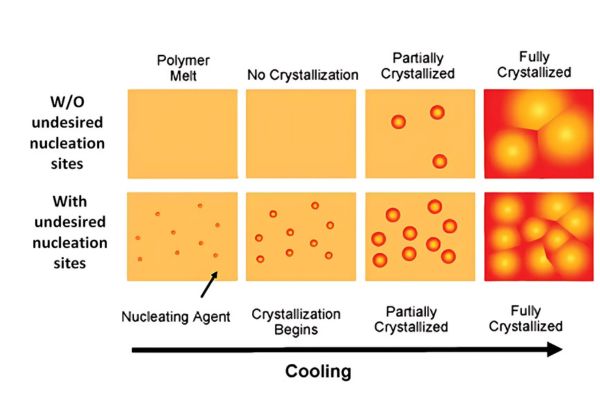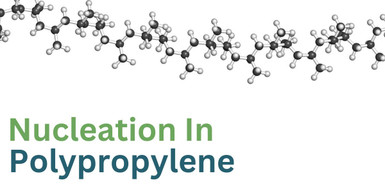Nucleation in Polypropylene and Semicon Process Tools

WHAT DOES IT MEAN TO SEMICON PROCESS TOOLS?
Last week we kicked a series on Polypropylene (PP) as it is used in Semiconductor Process Tools distinguishing between Homopolymer and Copolymer base chemistry. This week we will discuss the impact of nucleated resin chemistry specifically on Wet Process Tool wafer area applications using PP.
WHAT IS NUCLEATION?
A nucleating agent is an insoluble particulate that increases the rate of crystallization. Essentially these are seeds from which the crystallization process can germinate around. When a semi-crystalline polymer such as PP goes through the process of crystallization, first formed is the lamellae, which are partial alignments of polymer chains that fold over into regions of crystallization. As the process continues, the lamellae organize to form complex macro structures called spherulites.
The spherulites grow until they hit an adjacent spherulite, which halts the crystallization process. The size of the spherulites and the orientation of the crystalline structures determine the properties (physical and optical) of the polymer. In nucleated PP, crystallization occurs earlier in the cooling process and at a faster rate reducing processing times. Also, the nucleated PP density is much greater as spherulites are smaller due to rapid crystallization. Nucleating PP results in improved clarity, dimensional stability, higher HDT and more uniform shrinkage.

However, in Wet Process tools, where PP is used in chamber applications that are in contact with the chemistry in the proximity of the wafer, nucleating agents can contaminate the solutions in the form of leaching. Common nucleating agents are sodium benzoate, talc, and phosphate esters which are not desirable in the wafer proximity. For this reason, semiconductor applications for Wet Process chamber applications are often non-nucleated pure materials.
Keep in mind that PP is chosen for its chemical resistance properties rather than physical properties. Processing times are extended without nucleation and many of these PP shapes are thick parts. This results in a more expensive PP than general purpose.
CONTACT YOUR LOCAL PORT PLASTICS OFFICE FOR ALL YOUR SEMICONDUCTOR PLASTICS NEEDS!
|
Download As PDF |
| Nucleation in Polypropylene and Semicon Process Tools |

